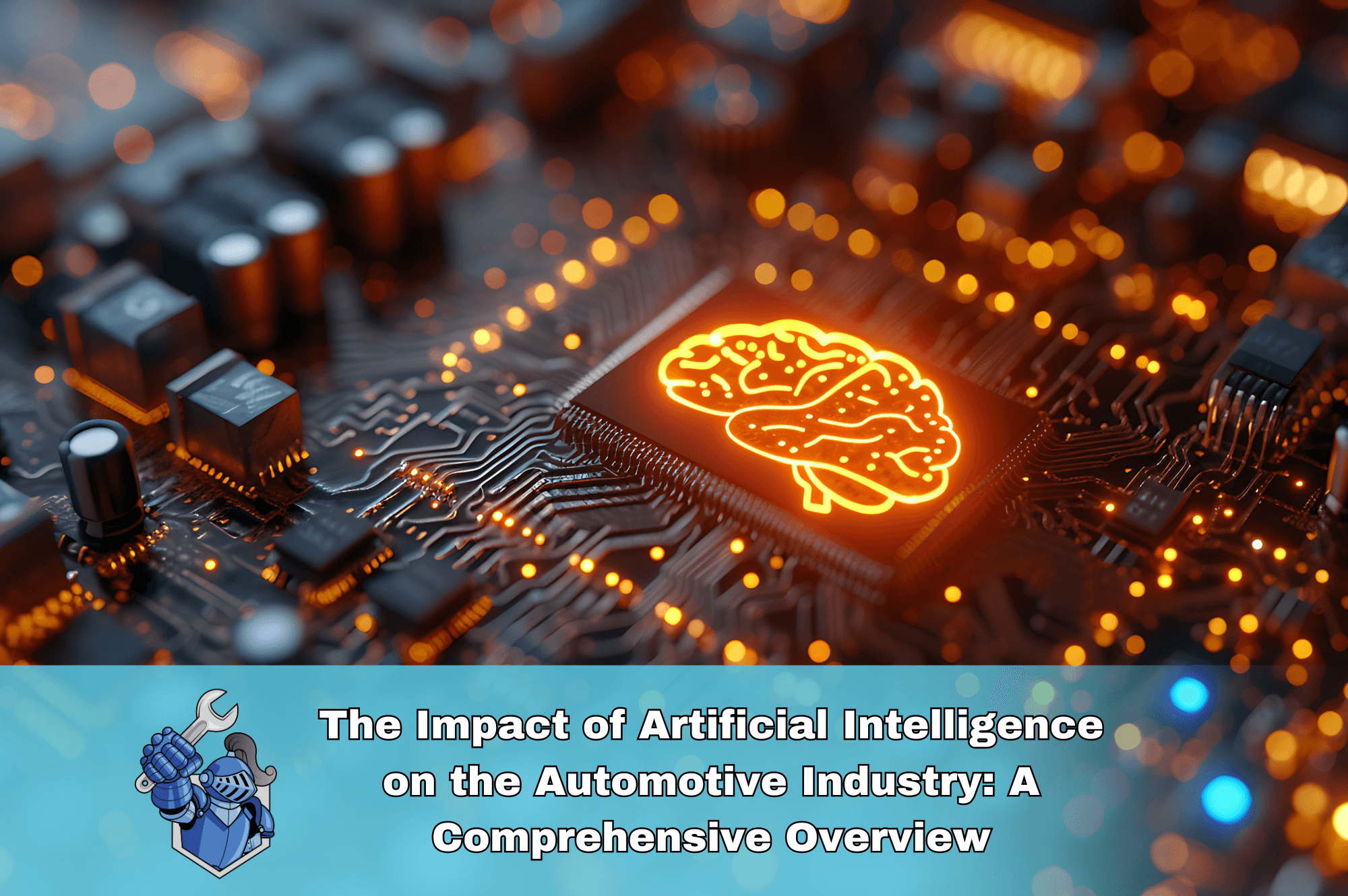Artificial Intelligence (AI) is revolutionizing the automotive industry, influencing every facet from production to customer service. Let's delve into how AI is transforming this sector, exploring its applications in production, design, marketing, sales, customer service, repair services, and advertising. This comprehensive overview will highlight current examples and future possibilities, underscoring how AI is shaping the automotive landscape.
AI in Automotive Production
Smart Manufacturing
AI has transformed the manufacturing process, making it more efficient and cost-effective. In smart factories, AI-driven robots perform repetitive tasks with precision, reducing human error and increasing productivity. For example, BMW uses AI to inspect parts and identify defects, ensuring higher quality and reducing waste.
Predictive Maintenance
Predictive maintenance leverages AI to foresee equipment failures before they occur, thus preventing costly downtime. By analyzing data from sensors embedded in machinery, AI can predict when maintenance is needed, optimizing the maintenance schedule and extending the lifespan of equipment. Toyota, for instance, uses AI-driven predictive maintenance to minimize disruptions in their production lines.
Supply Chain Optimization
AI optimizes supply chain management by predicting demand, managing inventory, and coordinating logistics. This results in reduced costs, improved efficiency, and timely delivery of materials. For instance, AI-driven systems help Ford manage their supply chain more effectively, ensuring that production runs smoothly without interruptions.
AI in Automotive Design
Generative Design
AI-powered generative design tools allow engineers to input design goals and constraints, and the software generates numerous design alternatives. This technology accelerates the design process and leads to innovative and efficient designs. Tesla's use of generative design in developing lightweight and durable car components exemplifies this application.
Digital Twins
Digital twins are virtual replicas of physical assets, used to simulate and analyze real-world conditions. In automotive design, digital twins allow manufacturers to test and refine designs in a virtual environment, reducing the need for physical prototypes. Ford utilizes digital twin technology to enhance vehicle performance and safety before production begins.
Human-Centric Design
AI facilitates human-centric design by analyzing user feedback and preferences to create more comfortable and intuitive vehicle interiors. Companies like Volvo use AI to study how drivers interact with their vehicles, leading to designs that improve user experience and satisfaction.
AI in Automotive Marketing and Sales
Personalized Marketing
AI enables highly personalized marketing campaigns by analyzing customer data to understand preferences and behaviors. Companies like Mercedes-Benz use AI to tailor marketing messages and offers to individual customers, enhancing engagement and conversion rates.
Virtual Showrooms
Virtual showrooms powered by AI provide an immersive shopping experience, allowing customers to explore and customize vehicles online. This technology is becoming increasingly popular, with companies like Audi offering virtual reality showrooms where customers can experience different car models and configurations from the comfort of their homes.
Predictive Sales Analysis
AI helps automotive companies forecast sales trends by analyzing market data, consumer behavior, and economic indicators. This predictive analysis enables companies to make informed decisions about inventory management, pricing strategies, and marketing efforts. Nissan, for example, uses AI to predict which car models will be in demand, allowing them to adjust production and marketing strategies accordingly.
AI in Customer Service
Chatbots and Virtual Assistants
AI-driven chatbots and virtual assistants provide instant customer support, handling inquiries, booking service appointments, and offering personalized recommendations. Nissan's use of AI chatbots to assist customers with vehicle information and service scheduling is a prime example of this technology in action.
Predictive Customer Insights
AI analyzes customer data to predict needs and preferences, enabling proactive customer service. By understanding when a customer might need a service appointment or a new vehicle, companies can reach out with timely offers and information. General Motors leverages AI to predict customer needs and enhance their service experience.
Sentiment Analysis
AI-powered sentiment analysis tools monitor social media and customer feedback to gauge public opinion about products and services. This allows automotive companies to address concerns, improve customer satisfaction, and build stronger relationships with their audience. Brands like Chevrolet use sentiment analysis to refine their customer service and marketing strategies.
AI in Repair Services
Automated Diagnostics
AI-powered diagnostic tools can quickly identify vehicle issues, improving repair accuracy and reducing service times. Mechanics use AI to diagnose problems based on data from vehicle sensors, streamlining the repair process. Companies like Bosch are developing AI-based diagnostic tools that assist technicians in pinpointing issues more efficiently.
Predictive Maintenance for Customers
Just as predictive maintenance benefits production, it also serves vehicle owners by alerting them to potential issues before they become severe. AI analyzes data from connected vehicles to predict when maintenance is needed, helping customers avoid breakdowns and costly repairs. This service is offered by companies like Hyundai, enhancing vehicle reliability and customer satisfaction.
Remote Diagnostics
AI enables remote diagnostics, allowing technicians to diagnose and sometimes fix issues without the vehicle being physically present. This technology saves time and reduces the inconvenience for customers, as seen with Tesla's ability to perform remote software updates and diagnostics.
AI in Advertising
Programmatic Advertising
AI-driven programmatic advertising automates the buying and placement of ads, targeting specific audiences with precision. By analyzing vast amounts of data, AI ensures ads reach the right people at the right time, maximizing ROI. Automakers like BMW use programmatic advertising to target potential buyers based on their online behavior and preferences.
Augmented Reality (AR) Advertising
AI enhances AR advertising by creating interactive and engaging experiences for customers. AR ads allow customers to visualize how a vehicle would look in their driveway or even take a virtual test drive. Companies like Volvo have implemented AI-driven AR ads to provide immersive experiences that captivate potential buyers.
Future Trends in AI and Automotive
Autonomous Vehicles
Autonomous vehicles are perhaps the most well-known application of AI in the automotive industry. AI technologies like computer vision, machine learning, and neural networks enable vehicles to navigate and operate without human intervention. Companies like Waymo and Tesla are at the forefront of developing fully autonomous vehicles, aiming to revolutionize transportation.
Connected Vehicles
Connected vehicles use AI to communicate with each other and with infrastructure, enhancing safety and efficiency. These vehicles can share data on traffic conditions, road hazards, and optimal routes, reducing congestion and improving travel times. The implementation of 5G technology will further enhance the capabilities of connected vehicles.
Enhanced Safety Features
AI continues to improve vehicle safety with features like advanced driver assistance systems (ADAS). These systems use AI to monitor the environment, detect potential hazards, and assist with driving tasks. Examples include automatic emergency braking, lane-keeping assistance, and adaptive cruise control, all designed to reduce accidents and save lives.
Sustainable Manufacturing
AI is also playing a role in making automotive manufacturing more sustainable. By optimizing energy usage, reducing waste, and improving recycling processes, AI helps manufacturers minimize their environmental footprint. Companies like Toyota are leveraging AI to develop more sustainable manufacturing practices, contributing to a greener future.
Electric Vehicles (EVs)
AI is critical in the development and optimization of electric vehicles (EVs). From battery management systems that maximize efficiency and lifespan to smart charging solutions that optimize energy consumption, AI is at the forefront of the EV revolution. Companies like Tesla and Rivian are leading the charge in integrating AI into their EV technologies.
Conclusion
Artificial Intelligence is undeniably transforming the automotive industry, driving innovations in production, design, marketing, sales, customer service, repair services, and advertising. As AI technologies continue to evolve, we can expect even more significant advancements and applications, making vehicles smarter, safer, and more efficient. Companies that embrace AI will be well-positioned to lead the automotive industry into the future.
For more information on how NobleQuote can help you protect your vehicle with advanced service contracts, visit our Learning Center.
Sources:
- The Impact and Benefits of AI in the Automotive Industry | Fullpath
- AI in the Automotive Industry: A 2024 Outlook | Simplilearn
- Artificial Intelligence in Car Manufacturing | Neural Concept
FAQ
How is AI used in automotive production?
AI is used in automotive production to enhance efficiency and quality. Smart manufacturing involves AI-driven robots performing repetitive tasks, while predictive maintenance anticipates equipment failures, reducing downtime and optimizing maintenance schedules.
What are digital twins in automotive design?
Digital twins are virtual replicas of physical assets used to simulate and analyze real-world conditions. In automotive design, they help test and refine vehicle designs in a virtual environment, reducing the need for physical prototypes.
How does AI personalize automotive marketing?
AI analyzes customer data to understand preferences and behaviors, enabling highly personalized marketing campaigns. This targeted approach increases customer engagement and conversion rates.
What role do AI chatbots play in customer service?
AI chatbots provide instant customer support, handling inquiries, booking service appointments, and offering personalized recommendations. They enhance the customer experience by providing timely and relevant assistance.
How does AI improve vehicle repair services?
AI-powered diagnostic tools quickly identify vehicle issues, improving repair accuracy and reducing service times. Predictive maintenance alerts customers to potential issues before they become severe, helping avoid breakdowns and costly repairs.
What is programmatic advertising in the automotive industry?
Programmatic advertising uses AI to automate the buying and placement of ads, targeting specific audiences with precision. This approach ensures ads reach the right people at the right time, maximizing return on investment.
What future trends in AI are expected in the automotive industry?
Future trends include the development of autonomous vehicles, connected vehicles, enhanced safety features, and sustainable manufacturing practices. AI will continue to drive innovations that make vehicles smarter, safer, and more efficient.
How is AI used in electric vehicles (EVs)?
AI optimizes various aspects of EVs, such as battery management systems for efficiency and lifespan, and smart charging solutions to optimize energy consumption. Companies like Tesla and Rivian integrate AI to enhance EV performance and sustainability.
Suggestions for you
Read MoreLet’s work together
Every week we showcase three charitable organizations that our donations are sent to. Our clients are able to choose which of these three will receive their gift when they add coverage to their vehicle...




